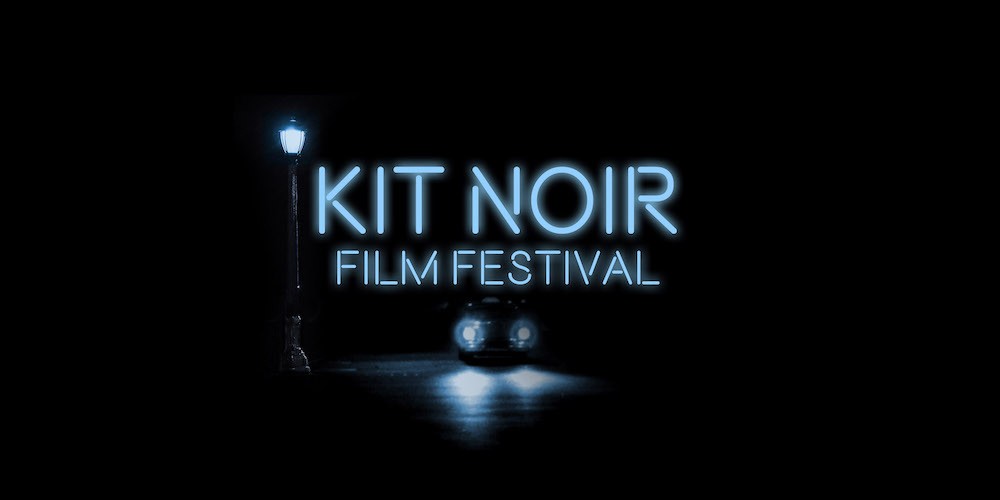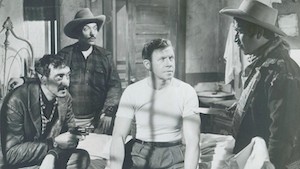2021 Kit Noir Film Festival Kicks Off with Anthony Mann's 'Border Incident'
The abridged, virtual iteration of the Dr. Saul and Dorothy Kit Film Noir Festival kicked off this past weekend with screenings of Anthony Mann’s Border Incident (1949) and John Farrow’s Where Danger Lives (1950). Launched in 2018, the ten-year festival series is devoted to the legacy of film noir. Each year, festival organizers select a distinct theme in order to revisit the noir canon from a unique perspective. This year’s selection of films focus on the US-Mexico border in film noir.
“Ordinarily, of course, we’d be welcoming you to the Lenfest Center for the Arts in Harlem to watch films together in person,” festival programmer and Professor Rob King said in his video introduction to the festival, “but sadly, the theatre lies empty with strict social distancing rules in place, so we’re having to bring the films to you in another way.” King, who is also the Director of Undergraduate Studies at the Columbia Film Program, is a film historian with interests in American genre cinema, popular culture, and social history. His award-winning The Fun Factory: The Keystone Film Company and the Emergence of Mass Culture (University of California Press, 2009) examines the role Keystone’s filmmakers played in developing new styles of slapstick comedy for moviegoers of the 1910s. His recent follow-up, Hokum! The Early Sound Slapstick Short and Depression-Era Mass Culture (University of California Press, 2017), challenges the received wisdom that sound destroyed the slapstick tradition.
King spoke more about the theme of this year’s festival in his introductory remarks: “The theme is Border Incidents: The US-Mexico border in film noir. That border has, of course, long been a third rail in American politics, particularly over the last several years, but it’s also been a recurrent setting in crime fiction. The border is a place where goods entering the US can be reclassified as contraband—where the citizens of neighboring states can become undocumented. But the border is also a zone through which domestic crime seeks its own escape, evading the arm of the US law to find safe haven. The border has, in this way, functioned in American popular culture as a kind of shadow zone of the law, a place where the categories of legality and illegality get constructed and reconstructed—a place one might imagine would be ripe for noir.”
Border Incident (1949), the first programmed film of this year’s festival series, is set at the California border and follows two INS operatives, one Mexican and one American, who investigate a human smuggling ring. Professor James Schamus spoke more about the film in his introduction: “The film is what I like to call an unstable text—a hodgepodge of genres and subgenres like docudrama, western, noir, and police procedural.” As Schamus noted, film scholar Jonathan Auerbach, who will join the festival’s culminating roundtable later this week, has written about how the film’s generic border crossings index the profound and disturbing ways the US-Mexican border is imagined as productive of American modes of subjectivity and subjection. “While the film’s producer and studio made sure to wrap [the film] with neo-liberal assurances that justice prevails, [director] Anthony Mann, with his signature male-centric, sado-masochistic violence, makes sure you won’t be able to unsee the necro-political regime that underwrites his story.”
The concluding two films of the series, Where Danger Lives (1950) and Touch of Evil (1958), also include pre-recorded introductions by alumnus Matthew Rivera (CC ’18) and Professor Annette Insdorf respectively. The festival will culminate with a roundtable discussion, moderated by King, with scholars and activists, including Jonathan Ryan (RAICES), Jonathan Auerbach (University of Maryland), Margarita de Orellana (Artes de México), and Homi K. Bhabha (Harvard University) on Thursday, March 18, 2021 at 7 pm ET. Catch the final screening of the series, Orson Welles’ Touch of Evil (1958) when it streams Saturday, March 20 – Sunday, March 21, 2021.
“At this time of unrest in America, it’s our hope that these films and the conversations that they inspire can help us probe the boundaries and the borders through which nations are made and remade,” King said.
The Dr. Saul and Dorothy Kit Film Noir Festival is programmed by Professor Rob King and managed by Soheil Rezayazdi. This festival is funded by a generous gift from alumnus Gordon Kit (CC ’76), in honor of his parents, and co-presented by the Film Program and Office of Public Programs and Engagement at Columbia University School of the Arts; and Columbia Global Centers. Read more about the festival here.

